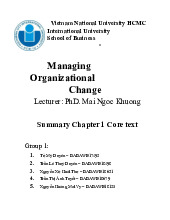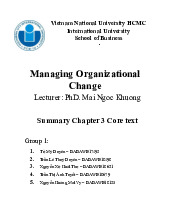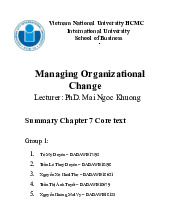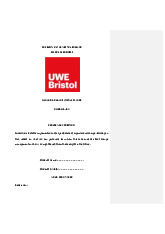






Preview text:
lOMoAR cPSD| 58504431
College of Business and Law
Module Handbook 2024/25 Module Name:
Managing Organisational Change Module Code: UMODML-15-3 Module Leader: Dr Hugh Waters lOMoAR cPSD| 58504431 Introduction
Welcome to our module – Managing Organisational Change. We are excited to be working with you
this coming semester. Amongst the teaching team are experienced academics and practitioners active
in the field of organisational change, and UWE Bristol is the home of the Bristol Leadership and Change
Centre. You are in good company!
The module explores both the academic ideas and the practice of managing organisational change. It
does this at multiple levels: the organisation, the group, and the individual. That said, our primary
interest is always in people – what happens to people during times of organisational change. We ask
that you reflect on your (sometimes nascent) experiences of organisational change, and think about
your future practice. In part, this is because employers have identified this area of knowledge and
expertise as critical to your future careers within their organisations. But, also, because we want you
to be able to make sense of what you are doing in times of organisational change and, indeed, make
sense of what is being done to you.
We will work extensively with case study analysis and reflection on personal experience/s. You are
expected to apply the academic ideas to the “real-world” practice of organisational change. This is not
a module in which you can merely regurgitate information from text books – we are targeting
knowledge and understanding, demonstrated through analysis and reflection, cognisant of the
implications of uncertainty and the ethical dilemmas facing change agents, and communicated with coherence and rigour.
Please note that this electronic version of the handbook will be kept up to date and you will be notified
of any significant changes. If you have taken a hard copy of any information please remember to refer
back to the electronic version to ensure that you are working with the most up to date information. Hugh Waters 01 September 2024 lOMoAR cPSD| 58504431 Contents
Introduction ............................................................................................................................... 2
1. Module team information ..................................................................................................... 4
2. Module enhancement ........................................................................................................... 4
3. Module specific information .................................................................................................. 4
4. Assessment(s) ........................................................................................................................ 5
5. Feedback ................................................................................................................................ 6
6. Reading and resources list(s) ................................................................................................. 6
7. Communication ...................................................................................................................... 7
8. Advice and support ................................................................................................................ 7 lOMoAR cPSD| 58504431
1. Module team information Module Leader: Dr Hugh Waters hugh.waters@uwe.ac.uk
Please find module team contact details listed under module staff and information tab on blackboard.
External examiners from other institutions are appointed to each module to act independently and
work with the module team in the management of threshold academic standards. 2. Module enhancement
Key recent enhancments made a result of student feedback have included:
• Written as well as discursive activities requiring analysis and reflection incorporated into lectorials
and seminars so that teaching activities are explicitly aligned with method of assessment.
• Formative feedback integrated within lectorials and seminars, so that students engage regularly
and frequently with ideas about how to progress through the module and demonstrate the
learning outcomes in the final assessment.
• Use of group presentations to present case study analysis and stimulate discursive and written
activites, so that all students can develop professional skills (e.g. analysing, interpreting,
presenting, reflecting_ ready for “real-world” practice.
3. Module specific information
The module specification can be accessed via this link.
The next thing to do is to explore the study units themselves – so that you know what to expect and
get a sense how (a) how best to prepare and (b) how to schedule the different study activities. There
are a wide range of materials that have been organised in each study unit to support you in managing your own learning.
You will find that each of the Study Units follow a similar format and guide you through a series of
activities. Each study unit begins with a Get started activity – highlighting the key ideas you will
encounter and detailing the work to be undertaken. Then comes the weekly Lectorial – which develops
ideas about analysis and reflection which help inform our study on the module and includes three
interactive tasks, framed around core skills: analysis, reflection, and learning. The Individual study lOMoAR cPSD| 58504431
activity sets out the work you need to do to prepare for your weekly seminar and to progress on the
module. Within each Seminar, you will find the emphasis is on your participation – often structured
around a case study, this is the key moment to be building and consolidating confidence around key
dimensions: knowledge and understanding, analysis and reflection, uncertainty and ethical dilemmas,
and coherence and rigour. This is also a weekly opportunity to give and receive formative feedback,
engaging with support from your seminar tutor and sharing your own ideas with others.
Each of the activities is designed to prepare you for your assessment. It is important that you engage
with this work, particularly because you are the key players in the seminars and if you do not prepare
the learning of all will be adversely affected. The role of the seminar tutor is to help facilitate learning
by helping you to develop your own ideas and stewarding discussions. 4. Assessment(s)
The assessment brief can be accessed via the assignment tab on blackboard.
At the end of the module, students will submit a single piece of coursework that is worth 100% of the
marks. This submission is in essay format and requires students to undertake analysis and reflection –
two core modes of thinking and learning that are developed throughout the module.
Please access the assessment brief which is a separate document on Blackboard where you will find
all essential details regarding submission requirements and relevant information.
The assignment question asks the following:
Analyse the implementation of organisational change in a case study of your choice using
three study units. Then, (a) critically reflect on your own experience/s of personal or
organisational change, (b) and how your learning on the module will inform your future practice.
Submission is due before 14:00 8th Jan 2025. (This submission is eligible for a 48 hour late submission
window.) Marks and feedback are due within a 20 working day turnaround time. As stated in the
assignment brief, all times are 24-hour clock, current local time (at time of submission) in the UK.
The maximum word limit for this coursework is 3,000. In order to access the full range of marks
available, you will want to make full use of the available word count – noting that, in line with UWE
Bristol’s Word Count Policy, anything after the maximum word count will not be marked. lOMoAR cPSD| 58504431 5. Feedback
You will receive feedback in a variety of forms throughout the module, therefore it is important to
attend timetabled sessions to ensure you do not miss out on these opportunities.
You will also receive feedback on assessed work; this may be individually or as a group/cohort, which
will enable you to understand how you have met the assessment criteria and identify areas for your further improvement.
Two types of feedback are common to this module. First, students receive formative feedback, which
is embedded throughout the learning process. Typically, it might follow an activity in a lectorial or
seminar, responding to a particular case study analysis presentation or a focused, written critical
reflection. The value of formative feedback lies in its timeliness – there is still time to adjust and
enhance performance in order to craft a more successful final submission. Second, students receive
summative feedback, which evaluates your overall progress and establishes how well you have
demonstrated the module learning outcomes. One on hand, this is “feedback”, because it critically
reviews the level of your achievement – but, on the other hand, this is also “feed forward” because it
helps students what to do next, particularly in terms of other modules that will be studied.
MyUWE is used to communicate unconfirmed marks, provide cover sheets for assessments and to
submit work. Further information on all aspects of your myUWE portal is available on the website.
6. Reading and resources list(s)
The reading list can be accessed via this link.
Your module reading list can be accessed online, either directly through the link (above) or through
the module’s Blackboard page.
The short video available on the library’s website will introduce you to some of the key features of the online reading list system. lOMoAR cPSD| 58504431 7. Communication
Throughout your time with us, you will receive regular communications; the main communication
channels used are Blackboard sites and your UWE email address. It is your responsibility to read
everything that you are sent and act upon it where appropriate. 8. Advice and support
There are a range of facilities and services available to go to for advice and support depending on what
the issue is. Remember – asking for help at the earliest possible stage will help you in the long run.
Please contact Information Point who may signpost you to other professional services such as: Student Support Advisers Disability Service Health and Wellbeing Services Money and Finance Immigration Advice Service



